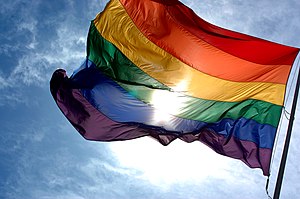 Image via Wikipedia
Image via WikipediaBy Emily Dugan
[LGBT Asylum News comment: we do not have an advance copy of the Stonewall report talked of here but believe it to be based on the 'Failing the grade' report released by UKLGIG 8 April. Bernard Keenan has pointed to the flaws in the new government's statement about its policy - see the end of this report - which this article entirely misses.]
Britain's immigration system is guilty of "institutional homophobia", according to a new report. The result is that 98 per cent of gay asylum-seekers fleeing persecution for their sexuality are returned home to a likely fate of death or persecution, says the report.
The hard-hitting study by the gay rights group Stonewall will add to pressure on the Home Secretary, Theresa May, and the new coalition government. This weekend, in a move applauded by campaigners, the Home Secretary said she would block moves by the Ugandan government to force the extradition of Ugandan gay asylum-seekers who had fled to the UK.
Proposed new laws in Uganda threaten imprisonment of anyone found "guilty" of homosexual acts. The proposals extend this to Ugandan nationals living abroad, who could face extradition back to Uganda.
The Home Office made it clear yesterday that the UK will only extradite people to their home countries if their "crime" was an offence in this country.
A spokesman for Refugee Action said: "This is a really welcome announcement and a very positive step. Obviously we will want to sit down with ministers and seek clarification over how a ban on deportations will be administered, but it is excellent news that extraditions to Uganda have been categorically ruled out."
The move follows international protests over the sentencing last week of two gay men in Malawi to 14 years' hard labour. Yesterday Andrew Mitchell, the International Development Secretary, said he would make "urgent representations" to the Malawi government over the jailing of Tiwonge Chimbalanga and Steven Monjeza.
Despite the Home Office statement, the Stonewall report is deeply critical of Britain's record on homosexual asylum-seekers. The report says UK Border Agency staff and the judiciary show "systemic discrimination" against those claiming asylum on the basis of sexual persecution.
The report, No Going Back, found that between 2005 and 2009 almost all cases involving people claiming asylum on the basis of their sexual orientation were refused by the Home Office. During the same period the general refusal rate for asylum-seekers in the UK was 76.5 per cent.
The report quotes one UKBA staff member admitting: "Someone from Jamaica claiming they're gay will just automatically be disbelieved." Another said "Colleagues have said that they don't know what questions to ask; we feel rude prying and embarrassed about asking these questions."
Many cases are turned down simply on the basis that someone fleeing a country where homosexuality is punishable by death or hard labour could simply "live discreetly" - in other words, go into hiding. UKBA staff admitted this was discriminatory.
UKBA staff also showed a lack of understanding and training, the report says. One case worker asked an asylum-seeker: "Why do you choose to be homosexual when you know it is illegal in your own country?"
Another senior caseworker suggested the type of books a person read could determine if they were gay. "I would look at how they've explored their sexuality in a cultural context," he said, adding, "reading Oscar Wilde perhaps, films and music".
Stonewall's chief executive, Ben Summerskill, said: "This report provides both shocking and clear evidence of institutional homophobia in Britain's asylum system. Legitimate asylum-seekers are frequently being deported. We'll now be pressing the UK Border Agency and the Home Office urgently to implement the manifesto promises made by both partners in the new government to end this profound injustice."
A Home Office spokesman said: "The new Government is committed to stopping the deportation of asylum-seekers who have had to leave particular countries because their sexual orientation or gender identification puts them at proven risk of imprisonment, torture or execution. We are considering the best way of implementing this policy. In terms of extradition, the UK will only extradite someone if they are wanted for an offence that is also a crime in the UK. Clearly this does not apply to homosexuality."

![Reblog this post [with Zemanta]](http://img.zemanta.com/reblog_e.png?x-id=f7ab715c-0806-471b-b319-1906d3a7410d)






 Join our page
Join our page


0 comments:
Post a Comment